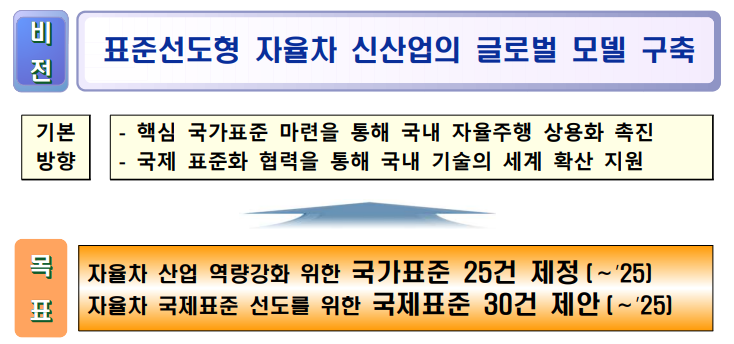국표원은 19일 서울 소피텔에서 미국 SAE 등 국내외 전문가 100여 명과 함께 ‘2023 자율차 표준화 포럼 총회 및 국제 콘퍼런스’를 개최하고 ‘자율차 표준화 추진 전략’을 발표했다.
SAE 등 표준화 기구와 표준 공동 개발 등 협력 강화
핵심 국가표준 마련 통해 국내 자율주행 상용화 촉진
국가기술표준원(이하 표준원)이 국내 자율주행 기술을 국제 표준에 반영하기 위해 적극적으로 나선다.
국표원은 19일 서울 소피텔에서 미국 SAE 등 국내외 전문가 100여 명과 함께 ‘2023 자율차 표준화 포럼 총회 및 국제 콘퍼런스’를 개최하고 ‘자율차 표준화 추진 전략’을 발표했다.
‘자율차 표준화 추진 전략’은 국내 140여 개 기관 300여 명의 전문가들로 구성된 ‘자율차 표준화 포럼’을 통해 지난 1년간 마련된 것으로, 데이터 표준, 핵심부품(라이다, 카메라 등) 표준 등 자율주행 구현을 위해 시급한 KS 25건을 2025년까지 제정 완료하고 국제표준 30건을 신규 제안하는 것을 골자로 한다.
아울러 국제표준화기구 ISO/IEC 뿐 아니라 자율차 산업에 실질적 영향력이 큰 SAE 등 사실상 표준화 기구와의 표준 공동 개발 등 협력을 강화하여 국내 자율주행 기술이 세계시장에서 채택될 수 있도록 지원한다.

국표원에서 발간한 ‘자율주행차 표준화 추진 전략’에 따르면 표준선도형 자율차 신산업의 글로벌 모델 구축을 비전으로 삼고, △핵심 국가표준 마련을 통해 국내 자율주행 상용화를 촉진 △국제 표준화 협력을 통해 국내 기술의 세계 확산 지원을 기본 방향으로 설정했다.
이를 목표로 2025년까지 자율차 산업 역량강화를 위한 국가표준 25건을 제정하고, 국제표준 선도를 위한 국제표준도 30건을 제안할 예정이다.
국표원은 3대 전략, 8개 추진 과제를 통해 위 목표를 달성하겠다는 계획을 세웠다.
첫째 전략은 자율차 산업의 공용언어, 데이터 표준을 중점적으로 추진하며 △자율차 데이터 표준 국가표준화 △데이터 표준 실증 및 확산을 과제로 삼았다. 자율차 전국 상용화를 위해 필수적인 데이터 표준을 최우선 개발하고 서울․세종 등 지자체 협력하여 실증을 추진한다.
두번째 전략은 자율차 산업 육성 및 실용화 지원 표준 마련으로 △핵심부품 및 시스템 성능시험 방법 표준화 △자율차 안전 및 국제규제 관련 표준 표준화 △자율주행 연계 서비스 모델 표준화 세 가지 과제를 설정했다. 기술을 가진 국내 기업의 시장진출을 위해 시험평가, 안전, 호환성 등 기반 성격의 표준화 추진한다는 내용이 담겨있다.
마지막 전략은 자율차 표준화 역량 강화 및 성과 확산으로 △자율차 표준화 포럼 기능 강화 △자율차 국가 R&D 성과의 표준화 연계 지원 △국제 협력을 통한 국내 기술의 해외 진출 지원, 세 가지 과제를 이행한다.
이날 행사에 참석한 윌리엄 가우스 SAE 국제협력국장은 미국의 자율차 표준화 동향을 소개하고 한국 전문가들과의 협력을 기대한다 밝혔다.
영국 워릭대의 시타르타 교수는 자율차의 성공을 위해 표준이 시장에 기민하게 반응하여야 한다고 강조하였으며, 중국 자동차기술연구센터 자오볼린 책임은 자율차를 포괄한 중국의 ICV(Intelligent & Connected Vehicle) 개념을 소개했다.
이어진 표준화 성과교류회에서는 라이다 표준안 등 자율주행기술개발혁신사업단과의 협력을 통한 연구개발(R&D) 연계 표준 개발 성과들을 공유했다.
진종욱 국표원장은 “자율주행 시장 선점을 위한 세계 각국의 기술경쟁은 이제 표준으로 확대되고 있다. 정부는 우리 표준에 대한 우방국과의 협력을 확대, 국내 기업이 세계무대로 뻗어갈 수 있도록 지원하겠다”고 밝혔다.
